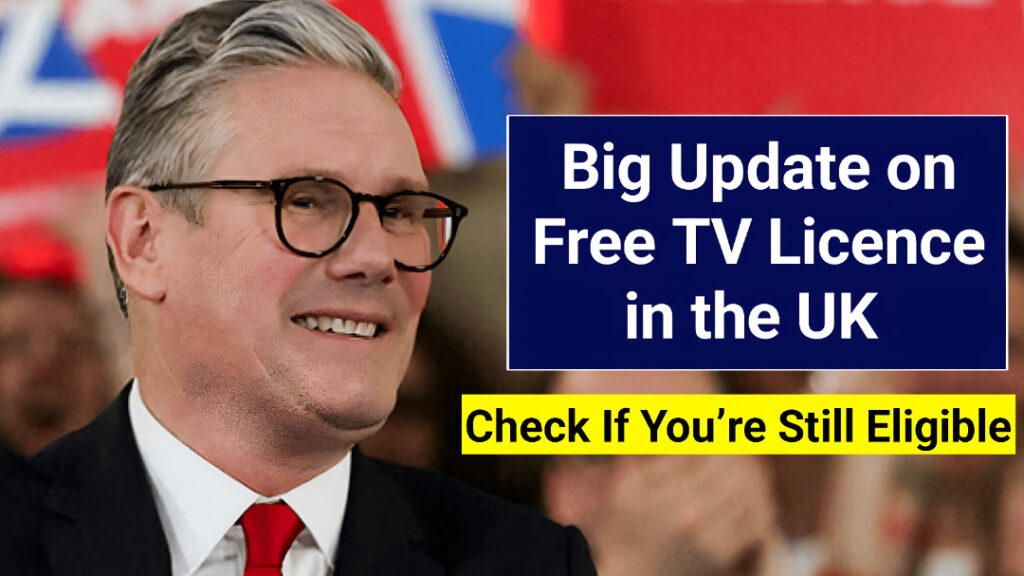Big Update on Free TV Licence in the UK: The UK government has officially announced major changes to the Free TV Licence scheme for 2025, and millions of households are now expected to feel the impact. For many years, pensioners and low-income families have relied on this benefit to access TV services without paying extra charges. With the updated rules, questions are rising about who will still qualify and how people can continue enjoying their free or reduced licences without disruption.
Why the Free TV Licence Rules Are Changing
The Free TV Licence scheme has been under review for a long time due to the rising costs of broadcasting, the ageing population, and increased financial pressure on the BBC. Running the scheme in its older format was becoming less sustainable, and government officials stressed the need for reforms. The new system has been introduced to make funding fairer, ensure the most vulnerable groups are protected, and secure the BBC’s financial future without putting unnecessary strain on taxpayers.
Who Still Qualifies for a Free TV Licence in 2025
Not everyone will lose their entitlement under the new rules. According to the latest update, pensioners aged 75 and above who are receiving Pension Credit will continue to qualify for a Free TV Licence. However, those who are over 75 but not on Pension Credit will most likely need to pay the standard licence fee, which currently stands at £169.50 per year. This change has created a divide, as some pensioners will still get the benefit while others will need to bear the cost.
Impact on Pensioners Across the UK
The biggest impact of these changes will clearly be felt by older citizens. For pensioners, television is more than just entertainment – it provides news updates, social connection, and a sense of routine. For those living on limited pensions or fixed incomes, paying for a licence can feel like an additional financial burden. Campaigners argue that stripping away free access from thousands of seniors risks pushing them further into isolation, while the government maintains that targeted support is a fairer approach.
What This Means for Low-Income Families
It’s not just pensioners who are affected. Some low-income families may still qualify for reduced or free TV Licences, depending on their circumstances. Typically, households on Universal Credit, Income Support, or Employment and Support Allowance may qualify for exemptions or discounts. Families facing rising living costs are being urged to carefully check eligibility so that they do not miss out on potential savings at a time when every pound matters.
How to Apply for a Free TV Licence in 2025
Those who meet the criteria for a Free TV Licence will need to make sure their applications are updated. The process can be done online through the official TV Licensing website, over the phone, or by completing a postal form. Pensioners on Pension Credit should confirm that their benefit information is linked directly to their TV Licence records to avoid losing their entitlement. Failing to update records in time could mean unnecessary charges or even penalties.
Government’s Reasoning Behind the Update
The government has defended the changes by highlighting the need to balance fairness, sustainability, and protection of the most vulnerable groups. Officials argue that targeting the Free TV Licence towards pensioners on Pension Credit ensures that support is given to those who genuinely need it most. While the idea sounds logical in principle, critics argue that many pensioners do not apply for Pension Credit due to lack of awareness, meaning a large section of needy citizens will end up paying extra.
Public Reaction and Criticism
Unsurprisingly, the update has sparked strong reactions across the UK. Pensioner rights groups have labelled the move unfair, describing it as a “stealth tax” on the elderly. Critics say that television is not a luxury for older people but a necessity, especially for those living alone. Several petitions have already been launched demanding that free licences be restored for all over-75s. Meanwhile, supporters of the reform insist that the system needs to be modernised to reflect today’s economic realities.
Alternatives and Support Available
For those who no longer qualify, there are still some alternatives. Pensioners who are partially sighted can apply for a 50% discount on their TV Licence, while residents in care homes may also be entitled to a heavily reduced fee under the Accommodation for Residential Care (ARC) licence. Charities are also stepping up efforts to help pensioners apply for Pension Credit, which could restore their eligibility for a free licence.
What Happens If You Don’t Pay
Households that no longer qualify but still refuse to pay the licence fee risk serious consequences. The penalties can include fines of up to £1,000, plus legal costs. Enforcement officers may visit homes to carry out checks, which is why it is strongly advised to confirm your status early and make sure payments are up to date. Ignoring the rules could cause more financial stress and damage to personal records.
Conclusion
The Free TV Licence update in 2025 has brought major changes, leaving pensioners and low-income households facing uncertainty. While those on Pension Credit remain protected, thousands of over-75s who are not claiming the benefit may lose out. The government insists that the new system is fairer, but campaigners warn of negative impacts on older people and families. To avoid unexpected costs, all eligible households must act quickly, update applications, and stay informed about the latest rules.
